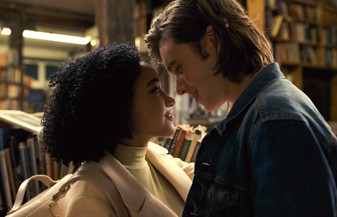The 400-Word Review: Everything, Everything
By Sean Collier
May 24, 2017
BoxOfficeProphets.com

Everything, Everything, based on a young-adult novel by Nicola Yoon (the culprit here), is mostly lovely. It is pleasantly and affectingly directed by Stella Meghie. Its young leads — Maddy (Amandla Stenberg, best known as Rue in The Hunger Games) and Olly (Nick Robinson, who you’ll remember as the older teen in Jurassic World) are charming and nuanced. Even its script, by J. Mills Goodloe, is breezy and solidly constructed.
It’s just a rubbish story.
Maddy has a rare immune disease which renders her unable to combat even common infections; as a result, she hasn’t left her sterilized home since infancy. Her mother, Pauline (Anika Noni Rose), cares for her, but isn’t interested in increasing her experience of life; after Pauline’s husband and their son, Maddy’s brother, were killed in a car accident, the prospect of losing her daughter is too much to bear.
When Olly moves in next door, though, a chaste courtship erupts from behind windowpanes (and mostly through text messages). Inevitably, the teens push the boundaries and Olly enters the house.
I suppose anything further would constitute spoiling the tale, so I’ll stop there — although you’ll see the turns coming (until, suddenly, you don’t).
Unfortunately for the many fine artists involved, the tale doesn’t work. The motivations are far too broad and always told, never shown; there is little to be done here but have characters explain why they’re feeling the things they are plainly feeling. The chemistry between the leads is palpable, but not enough to carry the film.
It is as though Yoon sat down to compose a dying-teen story (a genre that paid off at the box office precisely once, with The Fault in Our Stars, though it’s certainly marketable at the bookstore) and took the shortest possible path to that end. And when it came time for a resolution, the author seems to have painted herself into a corner — and wait until you see how she gets out of it!
That’s presumptuous; I haven’t read the book. Maybe this mess of a tale makes perfect sense there. On the screen, though, it’s an albatross around the collective necks of Meghie and her cast. It’s a shame; I’d like to see the same crew assembled for a film that doesn’t assume so little of its audience.
My Rating: 5/10
Sean Collier is the Associate Editor of Pittsburgh Magazine and a member of the Broadcast Film Critics Association. Read more from Sean at pittsburghmagazine.com/afterdark